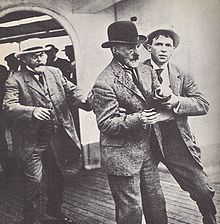- Charles Chapin
-
Charles Chapin (October 19, 1858 – December 13, 1930) was a New York newspaper editor. He was convicted of the murder of his wife and sentenced to a 20-year-to-life term in Sing Sing prison.
Chapin was born in upstate Watertown, New York and began his career on a Kansas newspaper, aged 14, moving later to Chicago to work for the Tribune, where he gained renown as a crime reporter. There he excelled sufficiently to be hired, in 1898, by the World, a New York daily, run by the Pulitzer family, which enjoyed one of the largest circulations in the country.
Chapin became editor of the evening edition of the World and was renowned as a hard taskmaster. He is said to have fired a total of 108 journalists during his tenure - one of them for daring to use the new-fangled word "questionnaire". Among his victims was his own publisher's son.
Opinions of Chapin differed. To many newspapermen he was "the greatest city editor who ever lived". Those who worked for him, however, often hated him; when Irvin S. Cobb, a World reporter, heard that his editor was sick, he is said to have looked up from his work and remarked, "I hope it’s nothing trivial." According to Andy Logan, a noted correspondent to The New Yorker, Chapin was "terrible tempered" and in the opinion of many of his staff had "a legendary imperviousness to human suffering, especially theirs."
One of Chapin's most celebrated coups was the publication of a photograph captured by an Evening World photographer showing the moment when New York mayor William Jay Gaynor was shot by a would-be assassin. William Warnecke, the photographer, who had been lining up a portrait of the mayor, snapped the shutter just as Gaynor crumpled to the ground; Chapin's response, when the developed photo arrived on his desk, was: "Blood all over him! And exclusive, too!"
Chapin's career in New York newspapers came to an end in September 1918 when, dogged by illness and debt, and concerned for his increasingly fragile wife of 38 years, he shot and killed his spouse while she was sleeping. News of the shooting shocked many of the newsman's colleagues. "They had known he would be involved in a murder some day," Logan writes, "but had always assumed he would be the victim."
Although he had apparently intended to commit suicide himself following the murder, the famous editor was instead arrested, convicted of the shooting, and sent to Sing Sing prison for a term of 20 years to life. There he wrote a memoir and became renowned for the rose garden he cultivated in the grounds, acquiring the nickname of "The Rose Man."
Chapin edited the prison newspaper at Sing Sing for a short time. He died there on December 13, 1930.
References
- Logan, Andy (1970). Against the Evidence: The Becker-Rosenthal Affair. New York: McCall Publishing Company. ISBN 0-8415-0025-8.
- Morris, James McGrath (2003). The Rose Man of Sing Sing: A True Tale of Life, Murder and Redemption in the Age of Yellow Journalism. New York: Fordham University Press. ISBN 0-8232-2267-5
External links
- The Rose Man at www.correctionhistory.org Correctionhistory.com article on Chapin's relationship with Sing Sing warden Lewis Lawes
- [1] Text of the first chapter of McGrath's Chapin biography
- AmericanHeritage.com / CHARLES CHAPIN at www.americanheritage.com Biography of Chapin from American Heritage
Categories:- 1858 births
- 1930 deaths
- American newspaper editors
- History of New York City
- American people convicted of murder
- People convicted of murder by New York
Wikimedia Foundation. 2010.

